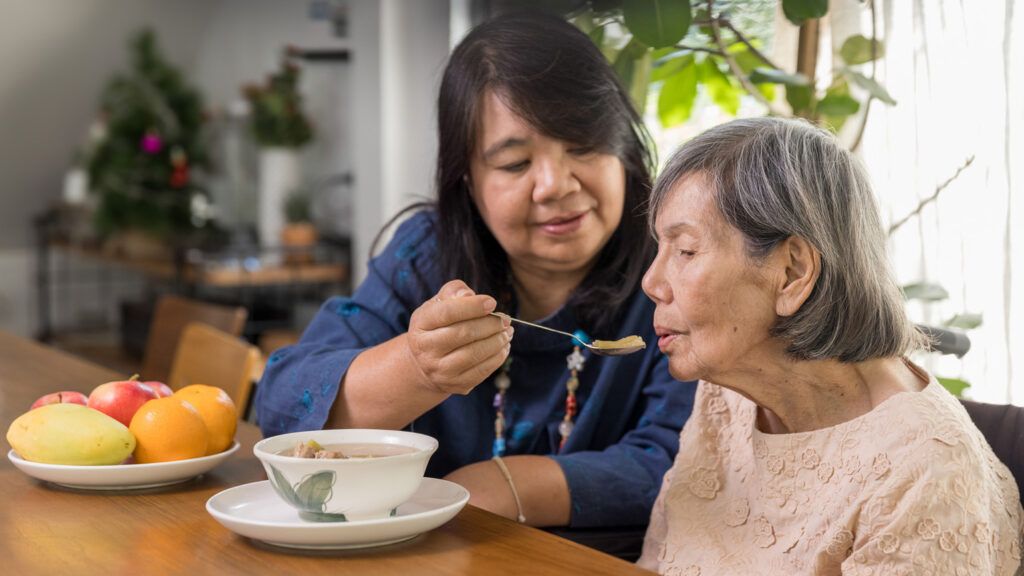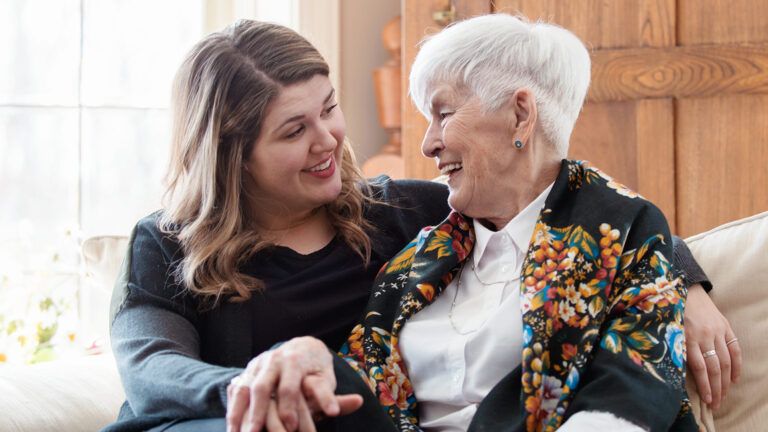Ashlee Cordell is a Research Assistant at Benjamin Rose Institute on Aging
Food preferences are specific to every individual. Likes and dislikes develop throughout the years. It’s natural to have favorite dishes, from comfort foods to gourmet concoctions. You may gravitate toward restaurants you’ve loved over the years, you may feel most comfortable eating in your dining room or, instead, may prefer to chill out at a TV table. As dear as these preferences may be, eating habits and needs can change with dementia. Those who live with the condition may undergo such changes, depending on what stage of dementia they are in. According to the Mayo Clinic, eating habits and preferences can be affected by a variety of factors, like:
- Memory loss
- Difficulties performing tasks in order or multitasking
- Sensory changes
- Agitation
- Teeth and gum concerns
- Prescription drugs
- Lack of exercise
- Poor coordination
- Depression
- Constipation
- Trouble chewing and swallowing
If your loved one is experiencing any of these concerns as a result of dementia, it may lead to mealtime challenges. Yet, by making little changes in the way you approach your loved one’s meals, you may find that you can greatly improve the experience for both of you.
The following shifts can have a big impact:
- Offer a variety of easy-to-eat nutritious foods.
Just as anyone else does, your loved one needs a well-balanced diet that provides adequate nutrition. People living with dementia require an array of healthy foods that are not difficult to chew and swallow. Make sure to offer foods that aren’t high in saturated fat, cholesterol, sugar and sodium. Hydration is another key factor. If your loved one doesn’t remember to drink enough liquids, you may need to give him or her regular gentle reminders and make water and other hydrating beverages readily available. You may also need to offer reminders to eat if your loved one isn’t able to keep track of whether or not he or she has skipped a meal.
- Simplify the table arrangement.
The way you set the table can make a positive difference. A simple and organized setting can actually help your loved one to eat enough. Try not to use patterned items. People living with dementia can get confused and frustrated by meals using patterned dishes, placemats, napkins and other linens, etc. Instead, try setting the table with solid colors only, which can help him or her to distinguish among the various items and the food. For instance, you could try placing different colorful foods on a white dish, which is then placed on top of a red tablecloth. Take care not to put too much on the plate at once, and serve foods at the proper temperatures, since your loved one may have trouble determining whether something is too hot or cold. Keep the table arrangement as pared down as possible, including only the food and items that are necessary for the meal.
- Create a comfortable and uplifting environment.
Minimize distractions. Provide a comfortable place for your loved one to sit. You may want to switch off the TV and play soft music that he or she enjoys. While you always want to honor your loved one’s specific preferences, you will also want to consider his or her current abilities and strengths. For instance, if handling utensils is a problem, try putting big handles on them or serve only easy-to-manage finger foods. It’s okay if things aren’t always nice and neat. And slow down. Afford your loved one the time to finish the meal. Dining together and sharing conversation in a relaxed manner can make the experience far more successful.
- Allow your loved one to take the lead.
It’s helpful for your loved one to maintain as much control as is feasible over all areas of life, including meals. Although his or her meal choices may seem odd to you at times, take them to heart. Including your loved one in the meal preparation can also foster a feeling of control and involvement.
Enjoyable and nutritious mealtimes are an important component of the care journey for people who live with dementia. To find additional nutrition and mealtime tips to help your loved one, explore the Alzheimer’s Association website. You may also reach out for professional advice from his or her healthcare team, especially from registered dietitian nutritionists (RDN) who can assess nutrient requirements and create individualized eating plans. Try Eat Right’s Find a Nutrition Expert tool to locate an RDN who fits your needs.





